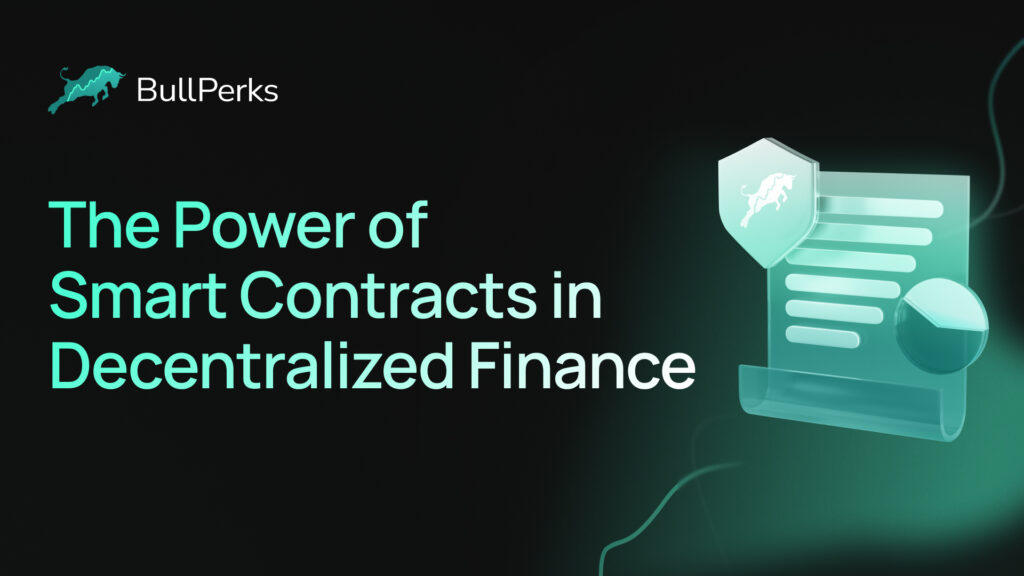
In recent years, the world of finance has undergone a dramatic transformation with the rise of decentralized finance (DeFi). At the heart of this revolution lies the concept of smart contracts, which are proving to be a powerful tool for safeguarding investments in the decentralized finance realm.
Smart contracts, powered by blockchain technology and running in decentralized networks, offer unparalleled security, transparency, and automation, making them a game-changer for investors seeking to protect their assets in the decentralized financial landscape.
Understanding Smart Contract DeFi

Source: Freepik
Smart contracts are self-executing contracts with the terms of the agreement directly written into code. They are built on blockchain technology, which ensures their immutability, transparency, and security. DeFi smart contracts function autonomously and automatically execute actions or transactions when specific conditions encoded within them are met.
Here is how they are created.
Coding the contract
A contract is created by developers who write code that specifies the terms and conditions of an agreement or transaction. These terms can be simple, such as transferring cryptocurrency from one party to another when payment is received, or complex, involving multiple conditions and parties.
Deploying on the blockchain
Once the contract code is written, it is deployed onto an immutable and transparent ledger, such as Ethereum.
Execution of terms
Once deployed, the contract sits dormant until it is triggered by an external event or condition. When the predefined conditions specified in the contract code are met (e.g. financial agreements), the contract automatically executes the agreed-upon actions.
DeFi smart contracts leverage blockchain technology to provide trustless, transparent, and secure transactions, while also reducing costs and increasing efficiency. Smart contracts and DeFi protocols have the potential to revolutionize various industries by streamlining processes, eliminating intermediaries, and enabling new forms of decentralized applications and services.
Benefits of Using Smart Contracts in Investment Scenarios

Source: Freepik
Using smart contracts in the decentralized finance space offers several significant benefits, revolutionizing traditional financial practices of centralized financial institutions. Here are some key advantages.
Security
Smart contracts provide a high level of security by leveraging blockchain technology. Once deployed on the blockchain, they are immutable and tamper-proof, meaning that they cannot be altered or manipulated by any party.
Transparency
Smart contracts and DeFi applications operate on public blockchain networks, where all transactions and contract executions are recorded transparently and permanently.
Automation
Smart contracts automate the execution of investment agreements, eliminating the need for intermediaries. Once predefined conditions are met, such as the receipt of funds or the fulfillment of contractual obligations, the smart contract automatically executes the agreed-upon actions.
Cost-effectiveness
By removing intermediaries and automating processes, smart contracts reduce the costs associated with investment transactions. Investors can save on fees and commissions, and also, smart contracts can facilitate peer-to-peer transactions, further reducing transaction costs and increasing the overall return on investment.
Global accessibility
Smart contracts operate on a decentralized infrastructure which makes them accessible to anyone with an internet connection, regardless of geographical location or jurisdiction.
Efficiency and speed
Contracts enable faster and more efficient settlement of investment transactions compared to traditional financial systems. Since smart contracts are self-executing and automated, they can execute transactions in real-time or near real-time.
Comparison with traditional contract mechanisms

Source: Freepik
When comparing smart contracts with traditional contract mechanisms on which traditional banking systems rely, several key differences emerge, highlighting the unique advantages that smart contracts and DeFi offer. Here's a comparison.
Security
Traditional contracts rely on legal frameworks and intermediaries to enforce agreements. However, there is a risk of fraud, errors, or disputes due to manual handling and potential manipulation of physical or digital documents within centralized finance.
Smart contract protocols are deployed on a blockchain, ensuring immutability and tamper-proof execution. Once deployed, the terms of the contract cannot be altered, providing a higher level of security and trust in the agreement's execution.
Enforceability
Enforcing traditional contracts often involves legal procedures, such as litigation or arbitration, which can be time-consuming, costly, and subject to interpretation by legal authorities.
Smart contracts automatically execute predefined terms and conditions when specific conditions are met, eliminating the need for manual enforcement. These underlying mechanisms ensure that agreements are carried out precisely as programmed, without the need for intermediaries or legal intervention.
Transparency
Traditional contracts may lack transparency, as parties may not have full visibility into the terms, conditions, or actions taken by other parties involved in the agreement.
Smart contracts operate on public blockchains, where all transactions and contract executions are recorded transparently and permanently.
Cost-effectiveness
Traditional contracts often involve intermediary fees, legal expenses, and administrative costs associated with drafting, reviewing, and enforcing agreements.
Smart contracts eliminate the need for intermediaries and automate contract execution, reducing costs associated with manual processes, legal procedures, and third-party services.
Speed and efficiency
Traditional contracts may suffer from delays in negotiation, signing, and enforcement, particularly when dealing with complex agreements or multiple parties.
Smart contracts enable faster and more efficient execution of agreements, as they are self-executing and automated.
Accessibility
Traditional contracts may be limited by geographical location, jurisdictional differences, or language barriers, making it challenging for parties to engage in cross-border transactions.
Smart contracts leverage distributed ledger technology to become accessible to anyone with an internet connection, regardless of geographical location or jurisdiction.
Security and Transparency
Smart contracts represent a paradigm shift in how investment transactions are conducted, offering unparalleled security and transparency through their utilization of blockchain technology. Let's delve into how they enhance security in investment transactions, the role of blockchain technology in ensuring transparency, and examples of potential risks mitigated by smart contracts.
Immutability: Contracts, once deployed on a blockchain, cannot be altered or tampered with, ensuring that the terms of the contract remain unchanged thus protecting users from fraud or unauthorized modifications.
Decentralization: Smart contracts operate on decentralized blockchains, eliminating the reliance on a single point of failure. This decentralization reduces the risk of hacking or manipulation, as there is no central authority that can be compromised.
Encryption: Blockchain technology employs cryptographic techniques to secure transactions and data. Smart contracts leverage this encryption to ensure that sensitive information, such as transaction details or asset ownership, remains secure and inaccessible to unauthorized parties.
Automated execution: Smart contracts automatically execute transactions based on predefined conditions. This automation reduces the risk of human error and ensures that transactions are executed precisely as programmed, without the possibility of deviation or manipulation.
The Role of Blockchain Technology in Ensuring Transparency

Source: Freepik
Blockchain networks maintain a transparent and immutable ledger of all transactions and contract executions. Smart contracts operate on these public ledgers, allowing anyone to verify the integrity of the contract code and track the flow of funds or assets in real time.
Smart contract code is typically open-source, meaning that it is publicly available for inspection, auditing, and verification. This transparency ensures that the contract code functions as intended and that there are no hidden or malicious functionalities.
Blockchain technology enables the traceability of transactions from their inception to their completion. Smart contracts leverage this traceability to provide investors with visibility into the entire lifecycle of an investment transaction, enhancing transparency and accountability.
In conclusion, smart contracts enhance security and transparency in investment transactions by leveraging blockchain technology's inherent properties of immutability, decentralization, encryption, and transparency.
Automation and Trust

Source: Freepik
Smart contracts are revolutionizing the investment landscape by automating processes and fostering trust among parties involved in investment agreements. Let's explore how smart contracts streamline investment processes through automation, build trust among stakeholders, and examine real-world applications and success stories.
Smart contracts automate the execution of investment transactions by self-executing when predefined conditions are met. This eliminates the need for manual intervention, streamlining the process and reducing the time and resources required to settle transactions.
DeFi applications can be programmed to enforce regulatory compliance automatically. By embedding compliance rules into the contract code, they ensure that transactions adhere to relevant regulations, reducing the risk of non-compliance and associated penalties.
Along with it, smart contracts facilitate the automated management of assets, such as tokenized securities or investment funds. They can automate tasks such as dividend distributions, asset rebalancing, or portfolio management, enhancing efficiency and reducing operational overhead.
In conclusion, smart contracts are transforming the investment landscape by automating processes and fostering trust among stakeholders. By streamlining investment processes, enhancing transparency, and eliminating intermediaries, smart contracts empower investors to engage in more efficient, secure, and transparent investment agreements.
Legal Implications and Compliance of Smart Contracts

Source: Freepik
Smart contracts present a novel approach to executing agreements and transactions, but they also raise important legal considerations and compliance requirements. Let's delve into how these implications are addressed and how compliance with regulatory frameworks is ensured.
Addressing legal considerations related to smart contracts
Legal considerations arise regarding the formation of smart contracts. While traditional contracts require offer, acceptance, and consideration, smart contracts operate based on code execution triggered by predefined conditions. Ensuring that these conditions accurately reflect the intent of the parties is crucial for enforceability.
Smart contracts are executed autonomously based on code, leaving little room for interpretation. However, legal ambiguities or unforeseen circumstances may still arise, necessitating mechanisms for dispute resolution and contract amendment.
Smart contracts must adhere to legal principles of enforceability, such as capacity, legality of purpose, and certainty of terms. Parties must ensure that contracts comply with applicable laws and regulations to be legally enforceable.
Ensuring compliance with regulatory frameworks
Smart contracts involving financial transactions with crypto assets or fiat currency must comply with KYC and AML regulations to prevent money laundering and terrorist financing. Implementing identity verification and transaction monitoring mechanisms helps to ensure this compliance.
Smart contracts may process personal data, triggering obligations under data protection laws such as the GDPR in Europe or CCPA in the United States. Implementing privacy-enhancing techniques and data minimization practices is essential for compliance.
Smart contracts involving tokenized securities must comply with securities regulations to prevent illegal securities offerings and ensure investor protection. Issuers must adhere to securities registration, disclosure, and reporting requirements imposed by regulatory authorities.
The evolving landscape of smart contract legality
Jurisdictions are beginning to recognize smart contracts as valid legal instruments. Legislation and court rulings are evolving to provide legal certainty and enforceability to this type of contract, paving the way for their broader adoption in commercial transactions.
With the increasing complexity of smart contract code, audits by legal and technical experts are becoming common practice to identify legal risks, ensure compliance, and enhance contract reliability.
Regulatory authorities are issuing guidance and regulations specific to smart contracts to address legal and compliance concerns. Collaborative efforts between industry stakeholders and regulators are essential to developing regulatory frameworks that promote innovation while safeguarding legal interests.
Protecting Investments with Smart Contracts: Case Studies and Examples

Source: Freepik
Smart contracts have demonstrated their ability to protect investments across various sectors, providing transparency, security, and automation. Let's explore some successful use cases, lessons learned from real-world implementations, and the potential for widespread adoption in investment sectors.
Decentralized Finance (DeFi) and decentralized exchanges
Decentralized exchanges (DEXs) like Uniswap and SushiSwap utilize smart contracts to enable trustless trading of digital assets, protecting investors from counterparty risk and ensuring fair and transparent transactions.
Yield farming platforms like Compound and Aave leverage smart contracts to automate lending and borrowing, as well as other DeFi applications, allowing investors to earn passive income while maintaining control of their assets. Yield farming, liquidity mining, lending, and borrowing funds - all these and many other activities of DeFi projects are enabled by smart contracts.
Real estate
Tokenization platforms such as RealT and Propy use smart contracts to fractionalize ownership of real estate properties, enabling investors to access fractional shares of high-value properties and diversify their portfolios.
Supply chain Finance
Supply chain finance platforms like IBM's TradeLens utilize smart contracts to automate payment settlements and facilitate trade finance transactions, reducing administrative overhead and streamlining cross-border trade.
Lessons Learned from Real-World Implementations
Conducting thorough code audits and security assessments is crucial to identifying and mitigating smart contract vulnerabilities. Several high-profile incidents, such as the DAO hack and the Parity wallet bug, underscore the importance of rigorous testing and auditing.
Ensuring compliance with relevant laws and regulations is another important point in the successful implementation of contracts, particularly in highly regulated sectors such as finance and real estate. Collaborating with legal experts and regulatory authorities from the outset helps navigate legal complexities and ensures compliance.
Educating users about the benefits and risks of smart contracts is key to fostering adoption and trust. Improving user interfaces and accessibility to platforms makes them more user-friendly and inclusive, encouraging broader participation.
Potential for Widespread Adoption in Various Investment Sectors
Smart contracts have the potential to revolutionize traditional financial services by providing secure, transparent, and automated investment products such as tokenized securities, decentralized lending, and automated asset management.
Smart contract applications offer the opportunity to democratize real estate investment and other investment types in real-world assets by fractionalizing ownership and enabling peer-to-peer trading of real estate assets. This opens up new avenues for liquidity and diversification in the real estate market as well as financial inclusion.
Smart contracts can streamline supply chain finance processes by automating payment settlements, reducing fraud, and improving transparency and traceability across the supply chain. This enhances efficiency and trust among supply chain participants.
In conclusion, smart contracts have proven to be effective in protecting investments across various sectors by providing transparency, security, and automation.
Future Outlook and Potential Challenges
Smart contracts have already begun to revolutionize investment protection, offering transparency, security, and automation. However, as their adoption continues to grow, certain challenges may arise alongside new opportunities for innovation. Let's explore predictions for the future role of smart contracts, anticipated challenges, and opportunities for further development.
Predictions for the future role of smart contracts in investment protection
The way how security smart contracts operate opens new ways to ensure investment protection, as more investors and institutions recognize their benefits in terms of transparency, security, and efficiency.
Smart contracts will likely expand into new asset classes beyond cryptocurrencies and tokenized securities, including real estate, commodities, and intellectual property rights. This expansion will democratize access to investment opportunities and enhance liquidity in traditionally illiquid markets.
Smart contracts will become increasingly integrated with traditional financial systems, enabling interoperability between decentralized and centralized platforms by using external data. This integration will bridge the gap between traditional and blockchain-based finance, facilitating seamless investment transactions and streamlining operations of the DeFi ecosystem.
Anticipated Challenges and How They Can Be Addressed
Regulatory uncertainty surrounding smart contracts may pose challenges for their widespread adoption. Clear and consistent regulatory frameworks will be essential to provide legal certainty and foster investor confidence.
Scalability and performance limitations of blockchain networks may hinder the widespread adoption of smart contracts, particularly during periods of high transaction volume. Continued research and development into scalability solutions, such as layer 2 protocols and sharding, are needed to address these challenges.
Security vulnerabilities in smart contract code remain a significant concern, as demonstrated by past exploits and hacks. Robust security practices, including thorough code audits, formal verification, and bug bounty programs, are essential to mitigate these risks and enhance the resilience of smart contracts.
Opportunities for Further Innovation and Development
Enhancing interoperability between different blockchain networks, DeFi applications, decentralized exchanges, and decentralized finance platforms will unlock new opportunities for innovation and collaboration. Standards such as cross-chain communication protocols and interoperable token standards will facilitate seamless asset transfer and interoperability between disparate systems and separate DeFi platforms.
Integrating privacy-enhancing technologies, such as zero-knowledge proofs and secure multi-party computation, into smart contracts will enable confidential transactions and data sharing while preserving privacy and confidentiality.
Developing standardized smart contract templates and libraries will streamline the deployment of common investment agreements and financial products, reducing development time and costs for market participants and thus boosting the development of the DeFi ecosystem.
Conclusion
In conclusion, the future outlook for smart contracts in investment protection is promising, with predictions of increased adoption, expansion into new asset classes, and integration with traditional finance.
However, challenges such as regulatory uncertainty, scalability limitations, and security vulnerabilities must be addressed to realize the full potential of smart contracts.
Nonetheless, opportunities for further innovation and development abound, paving the way for a more transparent, secure, and efficient investment landscape powered by smart contracts.












